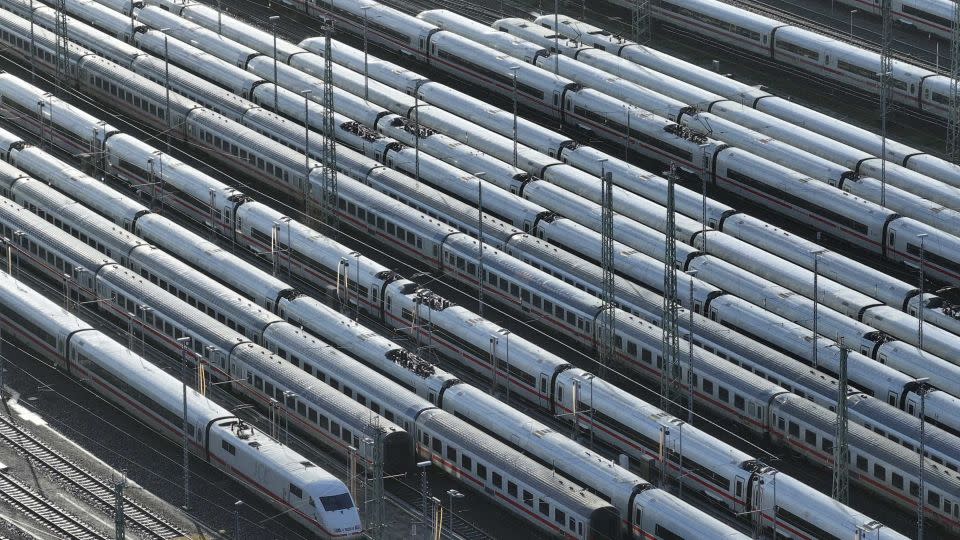German train drivers begin six-day strike, hitting travel and the economy
Germany is bracing for widespread disruption to rail services after train drivers embarked on a record six-day strike Wednesday that will wreak havoc on travel plans, strain supply chains and deal a new blow to the sputtering economy.
It’s the second time this month that members of Germany’s GDL Union have walked off the job in an ongoing wage dispute with Deutsche Bahn. The state-owned rail operator said the action would cause delays and cancellations to long-distance, regional and city commuter services until Monday. Freight transport will also face “considerable restrictions.”
Pre-booked tickets for travel during the strike will remain valid for future trips, Deutsche Bahn added. Passengers can also cancel their booking and receive a full refund. Some commuters expressed frustration at the train drivers’ latest action.
“I’ve always been understanding of strikes of all kinds. But my patience has now run out,” Ilse Terwey told CNN at Berlin’s main train station. “Nobody wins. Everyone loses. Passengers lose. The economy loses, the (railway’s) image loses.”
The longest industrial action in Deutsche Bahn’s 30-year history will pile more pressure on Germany’s vast manufacturing sector, which is already grappling with high energy costs, supply chain delays, elevated interest rates, and weak domestic and foreign demand. Almost a fifth of all freight in Germany is transported by rail, according to the country’s statistics office.
Industrial production, dominated by manufacturing, contracted 2% last year, the country’s statistics office said last week. That was a major drag on the economy overall, with gross domestic product falling 0.3% in 2023, likely the weakest performance among Europe’s big countries.

According to Commerzbank chief economist Joerg Kraemer, although the latest disruption could cost the transport sector “a mere” €30 million ($32.6 million) a day, costs will be much higher “if factories have to reduce their production due to missing supply.”
The strike “is straining the nerves of the public” and hurting “the already tarnished reputation of Germany as a business location,” he added.
Businesses have been scrambling to find workarounds, but industry bodies have already warned that these won’t fully offset the disruption, which coincides with bottlenecks caused by attacks on shipping in the Red Sea, one of the world’s main trade routes.
The strike represents “a major logistical challenge” for the chemical and pharmaceutical sector, the German Chemicals Industry Association told CNN.
“The railroads are very important for the industry’s logistics when it comes to supplying raw materials, and shipping intermediate and finished products,” added the trade body, whose member companies employ nearly 550,000 people.

A significant proportion of the 16,000 vehicles made in Germany every working day are also transported by rail, according to the German Association of the Automotive Industry, which warned that the disruption would extend beyond Germany’s borders.
“A short-term shift from rail to road is extremely difficult,” a spokesperson said. “The ongoing wage dispute is damaging Germany as a business location. We appeal to all parties involved to return to the negotiating table quickly and find a solution.”
Likewise, on Tuesday Deutsche Bahn spokesperson Anja Broker called on GDL to “negotiate and find compromises.”
“Everything is now on the table,” she said, including a “generous offer” of a wage increase worth up to 13% and a reduction in working hours.
Deutsche Bahn’s current offer includes a staggered wage increase: 4.8% would be implemented in August, followed by an additional 5% in April 2025. Then in January 2026, employees could choose to reduce their weekly working hours to 37 hours at the same pay or opt for a further 2.7% salary increase.
GDL has rejected that offer. The union wants a decrease in working hours from 38 to 35 hours per week with no reduction in salary. It has also asked for a pay increase of €555 ($603) per month and a one-off bonus of €3,000 ($3,260) to compensate for inflation.
“With its third and supposedly improved offer, Deutsche Bahn has once again shown that it is continuing to pursue its previous course of refusal and confrontation — with no sign of a willingness to reach an agreement,” said the union’s chairman Claus Weselsky.
Germany’s supply chains are already struggling because of the crisis in the Red Sea. Earlier this month, Tesla said it would pause production at its huge factory near Berlin for two weeks from January 29 because assaults on container ships along the vital trade route had delayed the delivery of components.
In the worst-case scenario, the damage from the rail strike could amount to €1 billion ($1.09 billion), or less than 1% of Germany’s annual GDP, taking into consideration existing pressure on supply chains, said Michael Groemling, head of macroeconomic research at the Cologne Institute for Economic Research.
For more CNN news and newsletters create an account at CNN.com

 Yahoo Finance
Yahoo Finance 